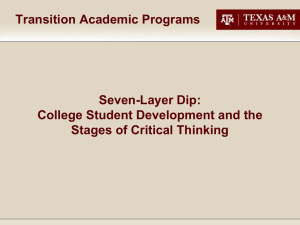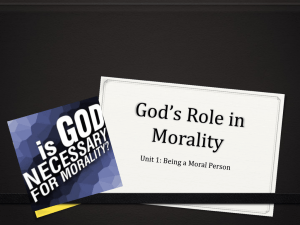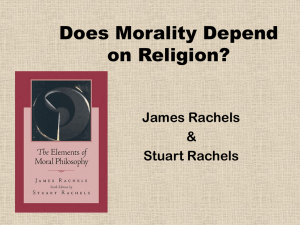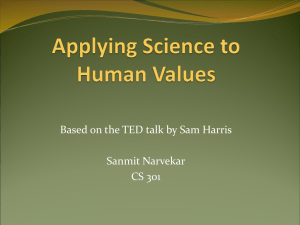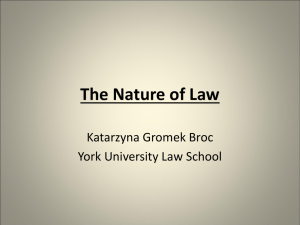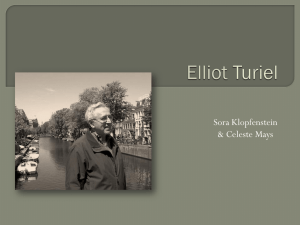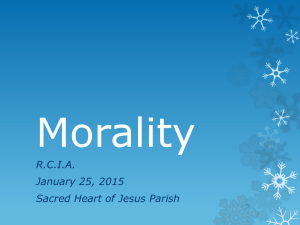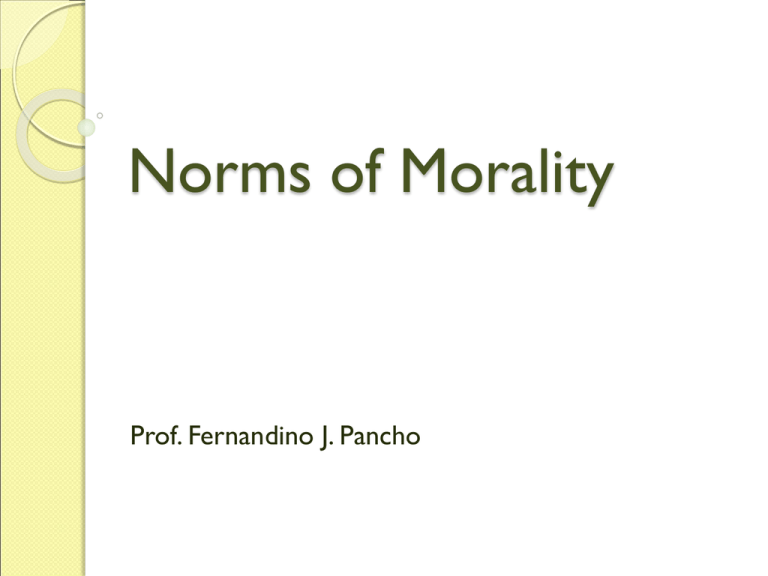
Norms of Morality
Prof. Fernandino J. Pancho
Definition
Norms of morality
◦ is the criteria of judgment about the sorts of person
we ought to be and the sorts of action we ought to
perform.
◦ the quality of things manifesting their conformity or
non-coformity with the norm or criteria. (that which conforms
is good or moral, that which do not conform is evil or immoral)
◦ The subjective norm of morality – Conscience
◦ The objective norm of morality – Law (natural)
Both natural law and conscience are rooted on Eternal Law,
the ultimate norm, thus, there is only one norm.
Conscience
The subjective/proximate norm of morality.
◦ It is proximate because it is what directly confronts an
action as good or bad.
Function: to examine/investigate, to judge,
to pass punishment on our moral actions.
◦ It approves & commends; reproaches & condemns;
forbids & commands; accuses & absolves.
Synderesis – it is the quality by which man
naturally perceives the truth of the selfevident principles of the moral order.
Conscience - definition
Derived from the Latin words “con” plus
“scientia” which means “with knowledge” of what
is right or wrong or “trial of oneslf” both in
accusation and in defense.
It is the “inner or little voice of God in man”
crying out man’s moral obligations and telling him
what to do and what to avoid in the moral order.
It is an act of the practical judgment of reason
deciding upon an individual action as good and to
be performed or as evil and to be avoided.
Conscience - Kinds
Antecedent – judgment is passed before an
action is performed.
Consequent – judgment is passed after an
action is performed.
Right/True – judges what is really good as good
and waht is really evil as evil
according to the true principles of
morality.
Erroneous/False – judges what is really bad as
good and vice versa according to a
false interpretation of the moral
principles.
Conscience - Kinds
Certain conscience – a subjective assurance of
the lawfulness or unlawfulness of
certain actions to be done or to be
omitted.
Doubtful conscience – a vacillating conscience,
which is unable to form a definite
judgment on a certain action.
A doubtful conscience must first be allowed to
settle its doubts before an action is performed.
Conscience - Kinds
Lax conscience – is one which refuses to be
bothered about the disticntion of
good and evil.
It tends to follow the easy way and to find excuses for omissions and
mistakes.
These are people who act on the impulse of “bahala na” on matters
of morals.
Scrupulous conscience – is a rigorous
conscience, extremely afraid of
commiting evil.
A scrupulous conscience is meticoulous and wants incontrovertible
proofs before it acts . It is frequently the result of a stuborn character.
For some, it merely means a serious concern about moral perfection.
Formation of Conscience
One has the obligation to cultivate a true and
certain conscience.
By studying and searching for truths in the
laws and in the sciences. Overcoming
ignorance and error in moral matters.
2. Cultivating good habits. Overcoming doubts.
3. By militating against evil,condemning and
fighting against it.
4. One must learn how to use properly his/her
freedom.
1.
Causes of Erroneous Conscience
A mistake along the process of practical
reasoning especially with regard to remote
conclusions of the moral principles.
2. Ignorance of law
3. Ignorance of the fact and other circumstances
modifying human action
4. Ignorance invoving future consequences,
especially those dependent on the free will of
others.
1.
Law - definition
It is an ordinance of reason directed towards the
common good and promulgated by the one who has
the care of the community or in authority.
Elements:
1. Ordinance/mandate – because it contains a decisive
command to perform or to avoid the performance of
something.
2. Reasonable – a law should not be dictated by a
despotic desire or momentary whim of an authority.
It must not be capricious, arbitrary, discriminatory
and whimsical.
Elements:
3. For the common good – means that that law should
benefit all citizens and not the exclusive benefit of some
favored groups.
- it is the sum total of benefits derived by individuals from
the government and from the nation as a whole.
- it is the universal happiness all men seek (St. Thomas).
4. Promulgated – means the law must be officially
published for the porpuse of informing the people.
(published in official gazzette or newspaper of general
circulation)
5. Enacted by a competent authority – a person who
is elected or appointed to make laws. (Congress)
Law - Kinds
1. Eternal Law
– it is the Divine reason or the will of God
commanding that the natural order of things
be preserved and forbidding that it be
disturbed (St. Augustine)
- it is the exemplar of Divine wisdom as
directing all actions and movements. (St.
Thomas)
Properties/Features: Unchangeable & Universal
Law - Kinds
2. Natural law
- it is man’s participation in the eternal law of God.
- it is an extension of the divine order of things as
apprehended by human reason.
- are not written decrees; figuratively speaking, they
are
“written in the hearts of men.” They are impressed in
human nature by the author of nature.
- it refers to the nature of all created things which is the principle
of movements and action: chemical, biological, psychological,
or rational.
- it is recognized by all men regardless of creed, race, culture,
historical circumstances.
- All agreed that there is an inner force that compels man towards good
and away from evil.”
Properties/Features: Universal, Obligatory, Recognizable by reason,
Immutable
Law - Kinds
3. Human Positive Law
- are the laws which proceed from a properly
constituted authority such as the state or the
church.
-this serve to supplement the provisions of the
natural law in view of the special needs of
the community.
-Laws of the State – contained in the
Constitution and code of Civil Law.
-Laws of the Church – compiled in the Canon
Law.
Human Positive Law - Properties
1.
2.
3.
4.
A human law should be in accord with the divine law.
A human law should be in accord with the natural law.
A human law must promote the common good.
A human law must have a universal character.
“Every human law has just so much of the nature of the
law as it is derived from the law of nature. But if, at
any point, it departs from the law of nature, it is no
longer a law but a perversion of law (St. Thomas).
Thus, an unjust law, have no moral binding force, and
should not be obeyed.
Defective Norms of Morality
Hedonism
Utilitarianism
Moral Rationalism
Moral Positivism
Moral Evolutionism
Moral Sensism
Communism
Hedonism
It is an ethical theory which holds that
the supreme end of man consists in the
acquisition of pleasure.
Sensible pleasures are the highest good of life.
Morality is grounded on the pleasure or
satisfaction that an act brings or entails.
The good action is the pleasant action.
The bad action is that which produces pain or
unhappiness.
Utilitarianism
Is a theory very mush akin to Hedonism.
This norm of morality holds that actions are right in
proportion as they tend to promote happiness, wrong
as they tend to produce unhappiness.
It makes “utility” the norm of morality.
The goodness or badness of an action would depend on
the effects or consequences of the action.
An act is good if and when it gives good results, if it
works, it makes you successful, if it makes you attain
your purpose, bad if it does not.
Types of Utilitarianism
Individual/egoistic utilitarianism – holds that
the norm of morality resides in the usefulness
of an action for the production of the temporal
happiness of the individual.
An act is good when it redounds to the temporal
welfare and happiness of the individual, and bad if it
hinders or hampers this happiness.
Social/altruistic utilitarianism – holds that an
act is good when it is conducive to the social
good or well-being
Commentary (Hedonism & Utilitarianism)
Merits
◦ It explains very well the emotional basis and
aspects of human action.
◦ It explains well the reason behind the doing of
action by most people
There is always some satisfaction accompanying the doing of
every good act.
There is no doubt that most people are motivated in their
action by their desire for satisfaction or happiness or wellbeing.
Commentary (Hedonism & Utilitarianism)
Defects
◦ Both propose an earthly goal for man, that is, the
temporal welfare here on earth.
The ultimate and supreme purpose of man cannot be found in
this life.
◦ Both make or tend to make morality relative
What is pleasant or useful to one may be painful and harmful
to another. Relative morality leads to moral chaos and
destruction.
Commentary (Hedonism & Utilitarianism)
Defects
◦ Both theories make morality extrinsic because they make
it depend on the effect or on a concomitant factor of an
act.
Morality is intrinsic, that is, based on the very essence of things and
on the nature of the act itself.
Satisfaction/pleasure may indicate and accompany the doing
of a good act; but the act is good not because it brings
satisfaction, but rather, it brings satisfaction because it is
good.
◦ The pleasure follows from the goodness and not the goodness from the
satisfaction
◦ The satisfaction/pleasure is merely an effect, and an indication but not
the cause or the reason of the goodness of an action.
Moral Rationalism – Immanuel Kant
Is the theory which maintains that all knowledge and all
truths are derived from human reason.
Human reason, therefore, is the source of all truths, all laws,
and all principles.
Human reason is the source of all moral laws and all moral
obligations.
Reason commands, and the commands of reason are absolute
and unconditional, absolutely binding on all men of all times
(Categorical Imperative).
Therefore, good must be done simply because we want. Virtue
must be practiced for virtue’s sake; goodness, for goodness sake.
Why we must do good?
◦ We must do good because we must, it is our duty to obey
unconditionally without questioning (Principle of Deontology).
Moral Rationalism
The command of reason is categorical and all are
obliged to obey, it is our moral duty to obey
unconditionally.
◦ Duty – is the very root, test and the mainspring of all
morally good acts.
All that is moral is motivated by pure sense of duty, by pure
reverence for the law.
Thus, morality is grounded on duty or moral obligation.
True morality, must be autonomous in character
(Autonomy of Reason).
◦ According to which theory: it is reason that commands and at
the same time it is reason that obeys.
Thus, reason will be the law-maker, the law-giver and law-obeyer at
the same time.
Commentary (Moral Rationalism)
Merits
◦ It emphasized the absolute and immutable nature of
morality
◦ It saves morality from the destructiveness and insanity
of moral relativity and skepticism.
Defects
◦ On Autonomy of Reason
Reason is the absolute law-maker, law-giver, law-abider.
(Autonomy of Reason)
Morality comes not from reason itself but from a higher and
other source than human reason. (Heteronomy of Reason)
Commentary (Moral Rationalism)
Defects
◦ Based on Heteronomy of Reason
◦ Human reason only sees things, but it does not make things.
◦ Human reason tells us the law, but it does not make the law.
◦ Moral law is not from human reason, it is not our own making,
but it is impose on us from a higher source.
If the law were made by human reason, then everything that
we would like to do could be approved by reason, but the fact
is that we have many things we like to do by which we know
are against the dictates of our conscience.
Nothing can be superior and inferior at the same time.
Commentary (Moral Rationalism)
Defects
◦ Duty as a norm of morality
Duty cannot be sole motive in the performance of
an act.
There are other motives that are more worthy and more
noble, such as love, pity, mercy, etc.
◦ On Universalization of Reason
There are many acts which cannot be universalized.
Ex. Dying a hero’s death by martyrdom
Moral Evolutionism
This is the theory of all those who holds that
morality is never fixed or absolute, but is
continually changing and evolving gradually into
a perfect morality.
Friedrich Nietzsche - believed that morality –
the distinction between right and wrong – did
not exist in the beginning or originally
unknown.
Good is that which anybody desired.
Moral Evolutionism
Friedrich Nietzsche
He was convinced that traditional values represented a “slave
morality,” a morality created by weak and resentful individuals
who encouraged such behavior as gentleness and kindness because
the behavior served their interests.
◦ These are the laws/values derived and based on the teachings of Christianity
which stands for meekness, humility, suffering pity, mercy, poverty, forgiveness and
love.
◦ These values glorify and favor the weak and produces weaklings
But, according to Nietzsche, we must produce the strong
◦ The law of nature is the survival of the fittest.
◦ The strong is destined by nature to live and rule.
◦ The weak has no right from nature to live. The weak who form the majority
must be eliminated in order to give way to the aristocracy of the strong.
Moral Evolutionism
Thus, Nietzsche, developed an idea of the
“Superman/Overman”.
◦ The “Superman/Overman” – was an individual who
overcame the slave morality of traditional values, and lived
according to his own values/morality.
◦ This superman is secure, independent, and highly
individualistic. The overman feels deeply, but his passions
are rationally controlled. Concentrating on the real world,
rather than on the rewards of the next world promised by
religion, the overman affirms life, including the suffering and
pain that accompany human existence.
Moral Evolutionism
He advanced this idea by saying that “God is dead,”
or the traditional morality was no longer relevant in
peoples lives.
For him, the end of all morality and society – to
produce the strong, the superman.
Thus, might, strength and power form the basis of true
morality.
◦ Good, is that one which makes one strong, powerful, and most
of all super human, and bad is that which is productive of the
weak.
Commentary (Moral Evolutionism)
The result – the chaotic, horrific, barbaric and
devastating World War II (German Invasion).
◦ Who thinks that they are the Aryan race (White
supremacy) superior to any other and destined to
rule and conquer the world.
◦ They devoured weaker nations and justified all the
massacres, tortures, and bloodshed of concentration
camps in their occupied countires on the theory that
thay are the strong and, therefore, can do no wrong.
Moral Positivism
This theory holds that the basis/source of all moral laws is the laws
of the State.
Good is that which is in accordance with the laws of the State;
bad is that which is forbidden by the State.
The proponent of this theory is Thomas Hobbes
◦ Nature was in a state of universal war. Mankind was in a state of
war before the formation of the State.
◦ Man is a wolf unto his fellowmen (Homo homini lupus)
◦ Thus, there was no law, no morality, no distinction between right
and wrong.
◦ To end this state of war and anarchy, men came together to form
the State.
Thus, laws, rights and duties were then established.
Morality then has it source, its origin from the laws of the State.
Commentary (Moral Positivism)
Defects
◦ It makes morality relative.
There are State Laws which are legal but not moral
(Abortion, Death Penalty, Same Sex Marriage).
◦ It reverses the natural order of things.
Before there was any State there was already
human nature with all its natural and inviolable
rights and the law (natural law) governing it.
Example:
Murder is always bad, even before there was any State law
prohibiting it. Murder is forbidden by law and is wrong
because it is clearly a violation against human nature.
Moral Sensism
Is an ethical theory which holds that man
is endowed with a special moral sense
(other than reason) by virtue of which
man distinguishes between right and
wrong.
◦ The basis/source of morality is man’s senses;
what a person’s feel about the human act.
◦ Good if I feel it is good; bad if I feel it is bad.
◦ This view expressed when we say he has “no
sense of morality,” “no moral taste”.
Commentary (Moral Sensism)
Defects
◦ It makes morality relative.
Morality is not based on feelings/senses.
Morality is not based on the mood of the person.
A human act is good or bad based on the norms of morality
which is conscience and natural law.
Communism
Its moral philosophy is the logical
consequence of metaphysics or view of
reality known as dialectic materialism.
According to this theory, matter is the only reality.
This sole entity or matter, is in constant flux or
motion and this accounts for all the events, motion
and change in the universe; so that all phenomena
of nature, all history, are nothing else but the
manifestation of this dialectic process inherent in
the nature of all things (matter).
Communism
It is founded on the theory of change,
evolution and revolution.
Everything is progressing towards the goal of
perfection; man, society and history naturally and
necessarily tend towards the attainment of the
ultimate objective: the perfect state here on
earth, the Classless Society.
All these are involved in the inexorable laws of
dialectic materialism.
The goal of man is his earthly happiness in a
classless society.
Communism
Morality is changing since all things
changes.
Good is that which brings about and hasten to
bring about the realization of a classless society; bad
that which hinders or delays its coming.
The end of man, which is the classless society, is the
norm of morality.
The end determines the morality of an act, the
means does not matter. Thus, “the end justifies
the means”.
Revolution, conflict, bloodshed, wars, espionage, etc., are
good if they bring about the desired end: Classless Society
Communism
Primacy of Economics
Economics is the sole basis of all civilization, all
progress, all history, all society.
It conditions and determines one’s religion and even
one’s mode of thinking and living.
Morality is likewise determined by economics, in
such a way that different economic conditions give
rise to different moralities.
Economics is the beginning and the ends of all
ethics/morality.
Commentary - Communism
Merit
◦ Communism explains well the importance
and necessity of economics in life.
Man is an economic being.
He has an stomach to feed, he has to earn a living to
support himself and his family, etc.
Defects
◦ It is vitiated with the fallacy of exclusiveness
and misproportion.
Commentary - Communism
While it is true that man can not live with bread, it
is likewise true that he does nor live by bread
alone.
While he is an economic being, he is not an
economic being exclusively, nor principally.
While we cannot disregard economics in life, we
cannot make it the sole and the most important
thing in life.
It may be the basis or a sine qua non condition of
earthly life, but it is not the end of all human beings,
though it is a necessary means to it.
Commentary - Communism
Comparison between Morality of communism and Christian
Morality:
1. Communism is based on the primacy of matter.
Christian morality is based on the primacy of the spirit.
2. Communism proposes an earthly goal for man
(temporal life).
Christian morality is primarily for the other world (eternal
life).
3. Communism denies the basic postulates of Christian
morality (the existence of God, freedom of the will,
immortality of the soul. It substitute matter for God; life in
a classless society for immortality, and the laws of the
dialectic for freedom.
Commentary - Communism
Comparison between Morality of communism and Christian
Morality:
4. Communism adheres to the position that “the end justifies the
means.”
Christian morality believe that “the end does not justify
the means.”
5. Communism subscribes to the evolutionistic view of morality.
Christian morality maintains that morality is absolute,
immutable and eternal.
6. Communism uses force, conflict, revolution for the attainment
of its goal: the classless society here on earth.
Christian morality teaches love, patience, right living and
prayer for the attainment of its ultimate end: eternal
happiness in heaven, with God.
Thank you! God bless!


